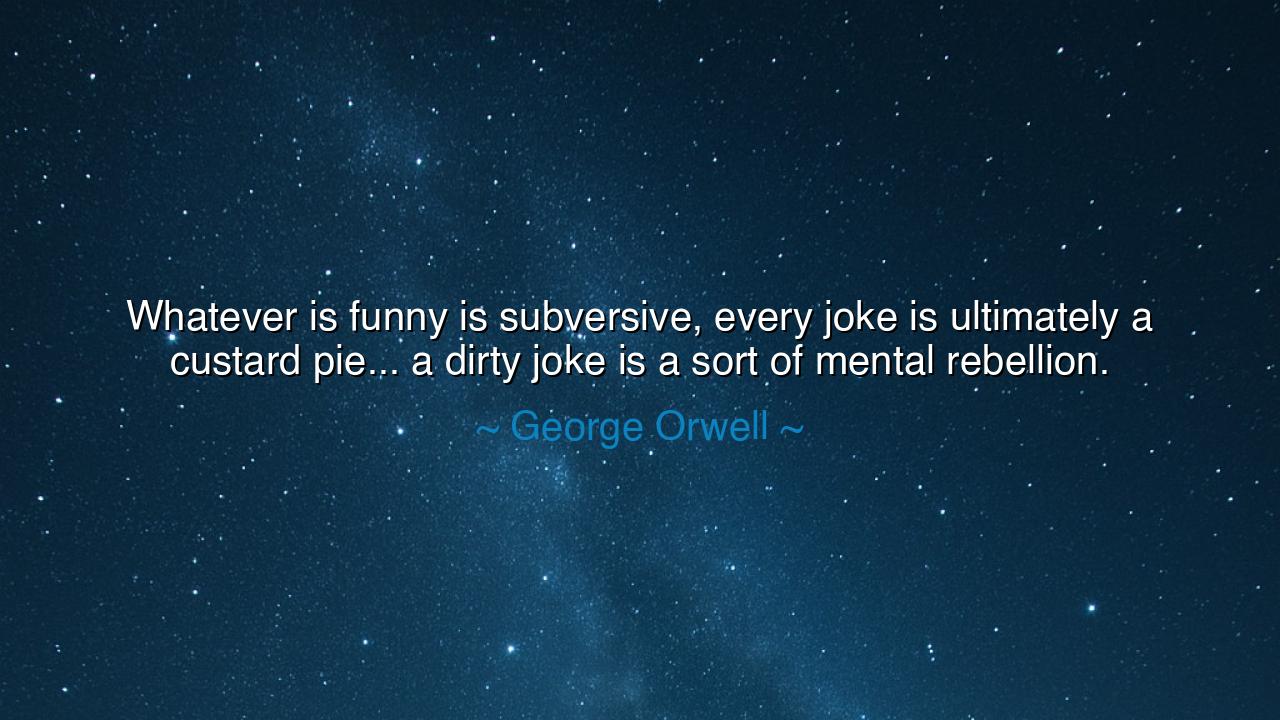
Whatever is funny is subversive, every joke is ultimately a
Whatever is funny is subversive, every joke is ultimately a custard pie... a dirty joke is a sort of mental rebellion.






“Whatever is funny is subversive, every joke is ultimately a custard pie… a dirty joke is a sort of mental rebellion.” Thus wrote George Orwell, the prophet of truth and the chronicler of tyranny, whose words pierced through illusion like a blade through fog. In these lines, he reveals that humor, though often wrapped in laughter, is a weapon — subtle, dangerous, and divine. To laugh, Orwell tells us, is not merely to find amusement, but to defy. Every joke — especially the ones that unsettle — is a small act of rebellion against power, hypocrisy, and fear. For when man laughs, he remembers that no authority, no system, no ruler can command his soul.
The custard pie, in Orwell’s image, is not just slapstick. It is the simplest form of uprising — the fool’s protest against the throne. To throw a pie is to expose the pompous as ridiculous, the proud as human. So too does the joke serve this sacred function: it brings down what is exalted and equalizes what is feared. Every age of oppression has understood this truth — that laughter is liberty made audible. Tyrants dread it more than weapons, for it makes them small. Orwell knew this well, having lived through times when speech was policed and thought itself was an act of danger. To joke, then, is to live freely in a world that seeks to control the mind.
In the courts of kings, it was the jester who alone could speak truth to power. Cloaked in motley and mirth, he wielded laughter like a dagger hidden in silk. His jokes mocked the king’s pride, his court’s deceit, his people’s folly — and yet the king dared not punish him, for laughter made the truth palatable. The jester was the soul’s insurgent, armed not with sword or shield, but with wit. Orwell’s insight springs from this same lineage: the comedian is the philosopher disguised in laughter, the rebel who smuggles truth past the guards of censorship and fear. Every era needs its jesters, for without them, power grows fat and blind.
Consider the story of Charlie Chaplin, that silent magician of motion. In his film The Great Dictator, he dared to parody the monstrous figure of Hitler at the height of the tyrant’s power. With a toothbrush mustache and a trembling voice, he turned terror into farce. The dictator, once omnipotent, was made foolish before the eyes of the world. This was not mere comedy — it was courage through laughter. Chaplin’s film was banned in several nations, but it broke through walls that armies could not. His joke, like Orwell’s “custard pie,” was subversion made beautiful. It was rebellion without blood, truth without sermon — the power of humor to awaken the conscience.
Even the “dirty joke,” Orwell says, carries the same spirit. It is the rebellion of the body against repression, the instinct against artificial restraint. To laugh at what society forbids is to reclaim what is natural — to say, “I am still free to think, to desire, to feel.” In every forbidden laugh, there is a spark of mental rebellion — a reminder that no code of decorum, no government of manners, can fully contain the raw, living human being. Laughter, especially in its irreverent forms, keeps the spirit wild. It declares that beneath the layers of rules and rituals, life itself remains untamed and untamable.
The origin of Orwell’s quote lies in his lifelong battle against systems that sought to silence individuality. He had seen how totalitarian states strangled the soul, not only with fear, but with solemnity. They outlawed laughter, for laughter is clarity — it breaks illusion. His essay Funny, But Not Vulgar (where this idea is born) explores how humor separates free societies from enslaved ones. To make a joke is to question authority; to forbid jokes is to declare one’s fragility. Thus, humor becomes the last refuge of the free mind — the whisper of humanity that tyranny can never quite crush.
And so, my friend, let this be your teaching: never stop laughing — especially when laughter is forbidden. Laugh at the proud, at the false, at the absurdity of your own fears. Let your laughter be both weapon and shield, for in it lies the soul’s independence. To laugh is to think; to think is to live. If you can find humor even in darkness, then you are already victorious over despair. Remember that every honest joke, every shared moment of laughter, weakens the chains that seek to bind the mind.
For Orwell’s wisdom endures like fire: laughter is rebellion clothed in joy. A world without humor is a world already conquered. But a people who can still laugh — even bitterly, even bravely — are not yet defeated. Therefore, hold your laughter sacred, for it is not the sound of foolishness, but the voice of freedom.






AAdministratorAdministrator
Welcome, honored guests. Please leave a comment, we will respond soon